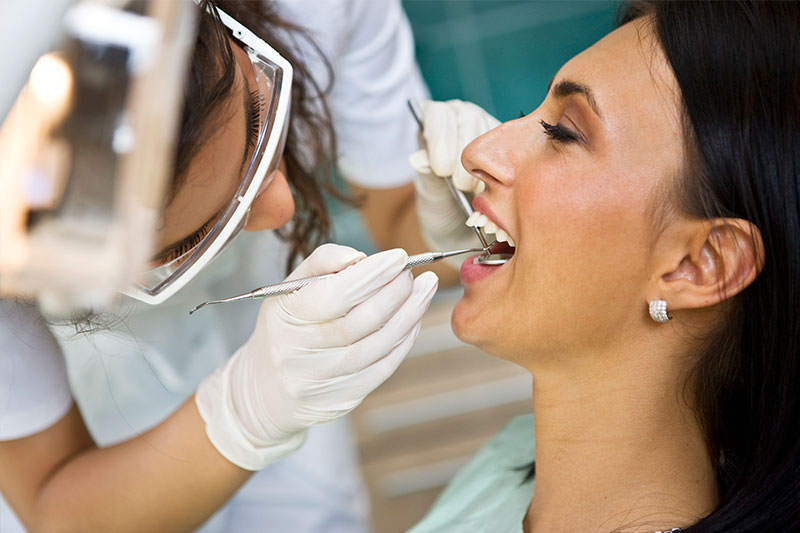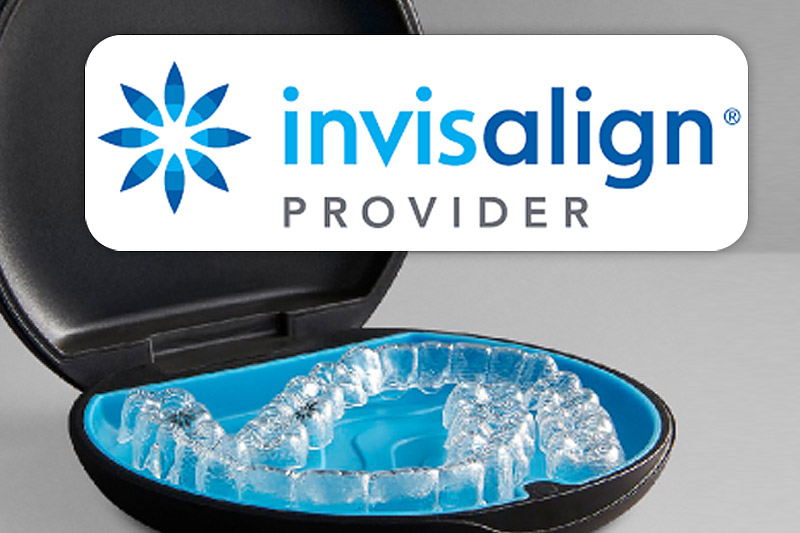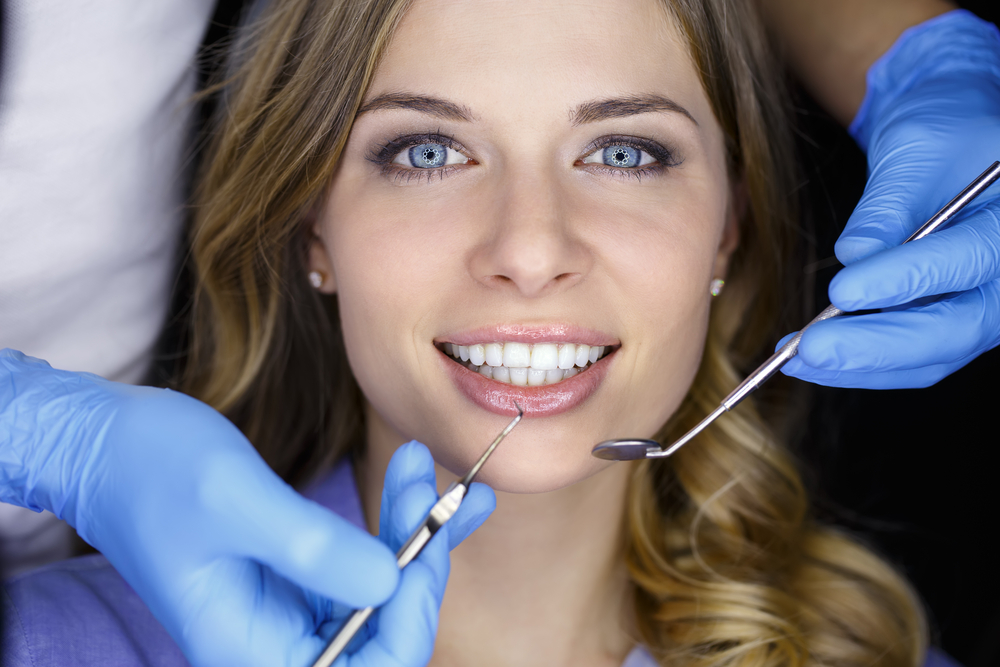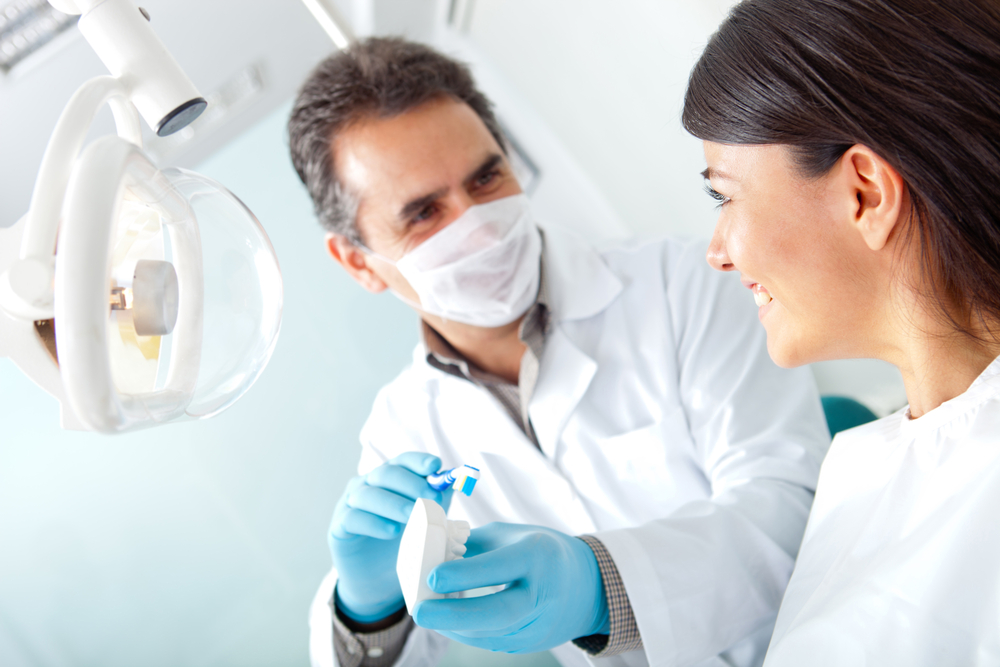Tag: teeth cleaning near me
Importance of Dental Exam & Teeth Cleaning in Watertown MN
No matter how diligent your at-home oral care routine is, harmful bacteria can still hide in your mouth in places that are hard to reach with regular brushing and flossing. After some time, the accumulated plaque and tartar can pose serious risks to your oral health and even affect your overall health if the bacteria spreads from your mouth to various body tissues. As such, it should be removed by a dental professional using specialized oral cleaning tools at a recommended interval.
Bacteria Growth in Your Mouth
The warm and moist environment in your mouth is very hospitable for the growth of bacteria, which manifests as:
- Plaque – the biofilm formed by bacteria colonies living in your mouth. It is responsible for producing acid that can wear your teeth causing cavities and/or damage gums if not continuously removed by regular brushing
- Tartar or calculus – forms when plaque is not removed properly, causing it to calcify and mineralize into a hard substance that attracts more harmful bacteria. Calculus can only be removed during dental cleanings using specialized tools.
Dental Cleanings Prevent Gum Disease
Bacteria in your mouth can accumulate to a point where it becomes active and destructive, resulting in gum infection. The first stage of gum infection is known as gingivitis, and is characterized by gum inflammation, swelling, and reddening. Due to sensitive gums, you may also notice some blood on your toothbrush or when rinsing your mouth after brushing. Fortunately, gingivitis can be successfully treated with professional dental cleaning and an improved at-home oral care routine.
If there are no interventions, gingivitis can advance to a more serious case of gum disease known as periodontitis or periodontal disease. It affects the foundation of your teeth – the bone tissue connecting your teeth to the jaw. If not treated promptly, periodontitis can cause severe bone loss that loosens your teeth with some even falling out. Though it’s irreversible, dental professionals can help you manage the symptoms and improve your oral health.
Schedule Your Dental Cleaning Today
Your dentist will examine your teeth and gums to determine the best type of dental cleaning in Watertown MN to improve your oral health and reduce the risk of advanced gum disease and cavities.
Dental Cleanings: Regular (Prophy) vs Deep Cleaning | Watertown MN
There are several types of dental cleanings that may help to remove accumulated plaque and tartar in your mouth, and improve your overall oral health. The American Dental Association recommends that prophylaxis cleanings be performed every six months by your general dentist as a part of your preventative dental care. Prophylaxis is also referred to as “teeth cleaning”, and involves the removal of accumulated plaque from the surface of your teeth above the gumline, as well as tooth polishing.
Prophylaxis is performed using fine hand instruments, as well as an ultrasonic scaler and a polishing cup and paste if there are no signs of gum disease. Generally, a good candidate for prophylaxis should have firm, pink gums with no bleeding, and the gum pockets should be within the healthy range of 1 – 3mm. Though the ADA recommends prophy cleaning every six months, people at high risk of gum disease and other oral issues may require more frequent cleaning at 8 – 16 week intervals.
Will Prophylaxis Cleaning Work for Me?
There are some cases where regular prophylaxis cleaning may not be enough to improve your oral health. Your dental professional will examine your teeth and gums and then determine the best type of alternative cleaning for your individual needs. The other types of dental cleaning include:
- Full Mouth Debridement – it is recommended for people whose teeth have not been professionally cleaned for more than a year, resulting in heavy plaque and tartar (calculus) build-up. This procedure is typically performed before an oral examination and diagnosis to ensure good visibility of the actual condition of your mouth
- Scaling and root planing – commonly referred to as “deep cleaning”, this procedure is recommended for patients who exhibit signs of periodontal disease, such as deeper gum pockets (over 3mm), inflammation and bleeding gums, accumulation of plaque and tartar below the gumline, and/or loss of bone tissue supporting the teeth.
- Periodontal maintenance – following treatment for periodontal disease, your dental professional may recommend this specialized cleaning every 8 – 12 weeks as part of your ongoing treatment for chronic periodontal disease to reduce the risk of adverse symptoms.
Please visit your dentist to discuss your dental cleaning in Watertown MN today.
Looking For A New Dentist? Dental Exam & Cleaning | Watertown MN
The importance of your exam and cleaning
The most basic dental appointment is also the most necessary: This is the bi-annual checkup and clean. Routine exams and cleanings create a strong base for your oral health. Keeping up with these appointments will help you maintain exceptional oral health and avoid disease or decay.
Dental exams are typically quick and easy. You’ll spend about 45 minutes to an hour at the office for a routine exam with your dentist!
Dental Exam
At the exam, we will be checking your teeth with a few “bite downs” and “open wides”. The process of looking for any dental issues is rather straightforward. Depending on your case, the dentist might also want to do a quick set of X-rays as well.
Dental Cleaning
The cleaning portion of the exam is more effective than any toothbrush. Following the removal of plaque and tartar, your dentist will conduct the deepest clean possible, using a high-powered electric brush. Your dentist will then floss your teeth for you and will finish off the session with a fluoride treatment that protects teeth against cavities for months on end. You will leave the dentist’s office not only looking sharp but also feeling fresh.
Dental Exam & Cleanings in Watertown MN
Dental professionals agree that you should schedule a dental assessment at least once a year. This is an important examination that aids in the early diagnosis of potential oral problems, such as chips and cracks, cavities, gum disease, and even oral cancer. Besides evaluating your dental health, dentists also perform professional teeth cleaning to remove plaque and calculus or tartar, which are responsible for most common oral problems.
A dental cleaning is typically performed by a dental hygienist. But before the cleaning commences, they will first physically check your teeth, gums, tongue, and the entire mouth for any concerns using a small mirror. If there are any noticeable problems, the dental hygienist will consult the dentist to determine whether it’s safe to proceed with the cleaning.
A typical professional teeth cleaning procedure involves the following five steps:
Step 1: Plaque and Tartar Removal
Your dental professional uses a scaler to remove plaque and calculus from the surface of each tooth, targeting the area above the gums, between the teeth, and around the gum line. The duration of this step depends on how long it has been since your last cleaning.
Step 2: Polishing
When all the plaque and tartar has been removed from your teeth, the hygienist will use a special brush with a soft rubber cup. This not only removes any surface stains, but also makes your tooth surface smooth and shiny to make it harder for plaque to form.
Step 3: Expert Flossing
Professional flossing helps to thoroughly clean the area between your teeth to remove any leftover plaque and toothpaste from the previous steps.
Step 4: Rinsing
The dental hygienist uses a mouth rinse containing liquid fluoride to remove any debris and clean your mouth.
Step 5: Fluoride Treatment
As the final step, your dental hygienist may apply flavored fluoride by putting it in flexible trays that are then placed over your teeth for 30 seconds. This helps to strengthen your teeth and enhance the protection against plaque and calculus.
Keep in mind that this is the standard dental cleaning process. If you have gum disease, your dental hygienist may recommend deep scaling to remove plaque from your tooth roots as well. To learn more about what to expect from a routine dental exam & cleaning in Watertown MN, please contact your dental office today.
Teeth Cleaning Near Me, Watertown MN
There are both beneficial and harmful bacteria in your mouth. The beneficial bacteria aids in digestion, while the harmful kind is associated with gum disease, dental caries, bad breath, and many other oral issues. Through daily brushing and flossing at home, you can maintain a low level of harmful bacteria in your mouth to such a level that it doesn’t adversely affect your oral health in the short-term. Unfortunately, there are areas in your mouth that are hard to clean with a toothbrush, where bacteria may build up in your mouth and cause harm.
Professional cleaning helps to prevent this by targeting every corner of your mouth to remove built-up plaque and calculus. This offers many benefits, including:
- Reduced tooth wear and cavities from acids in the mouth – plaque, the biofilm formed by bacteria colonies living in your mouth, is responsible for producing acid that can erode your teeth, cause cavities, and damage your gums.
- Maintaining your bright smile – when plaque is not removed properly, it may calcify and mineralize into a hard substance (tartar) that not only changes the aesthetic appearance of your teeth, but also attracts more harmful bacteria. Tartar or calculus can only be removed during dental cleanings using specialized tools.
- Reduced risk of gingivitis – bacteria in your mouth can accumulate to a point where it becomes active and destructive, resulting in gum infection. The first stage of gum infection is known as gingivitis, and is characterized by gum inflammation, swelling, and reddening. Due to sensitive gums, you may also notice some blood on your toothbrush or when rinsing your mouth after brushing. Fortunately, gingivitis can be successfully treated with professional dental cleaning and an improved at-home oral care routine.
- Prevention of periodontitis – If there are no interventions, gingivitis can advance to a more serious, chronic, and irreversible case of gum disease known as periodontitis or periodontal disease. It affects the foundation of your teeth – the bone tissue connecting your teeth to the jaw. If not treated promptly, periodontitis can cause severe bone loss that loosens your teeth with some even falling out. Though it’s irreversible, dental professionals can help you manage the symptoms and improve your oral health.
Schedule Dental Cleaning Today
Professional dental cleaning can help you enjoy a healthy mouth and smile. Please visit your dentist for a thorough examination of your mouth and to determine the best type of dental cleaning in Watertown MN to improve your oral health.
Types of Dental Cleanings in Watertown MN
Scheduled professional teeth cleaning is a key component of your preventative dental care to maintain optimal dental health and minimize the risk of gum disease and tooth decay. The American Dental Association recommends that dental cleanings be performed every six months by a dental practitioner. However, some people may require more frequent cleanings depending on their risk factors.
Your dentist may recommend one of the following types of dental cleanings after examining your teeth and gums:
1. Prophylaxis (prophy)
This is commonly referred to as “teeth cleaning”, and involves the removal of accumulated plaque from your teeth, which cannot be removed by regular brushing at home. The process also includes tooth polishing, and should be done every 8 to 16 weeks. Generally, a good candidate for prophylaxis should have firm, pink gums with no bleeding or gum pockets over 3mm.
2. Full Mouth Debridement
If your teeth are not professionally cleaned for more than a year, your teeth may have heavy plaque and tartar (calculus) build-up. In such a case, regular prophylaxis may not be sufficient. So your dental professional may recommend full mouth debridement using hand tools and a micro-ultrasonic scaler to remove the plaque and calculus from your teeth and gums, and restore the health of your mouth.
3. Scaling and Root Planing
Commonly referred to as “deep cleaning”, this procedure is usually recommended for patients who exhibit signs of periodontal disease, such as deeper gum pockets (over 3mm), inflammation and bleeding gums, accumulation of plaque and tartar below the gumline, and/or loss of bone tissue supporting the teeth.
4. Periodontal Maintenance
Following treatment for periodontal disease through scaling and root planing or periodontal surgery, your dental professional may recommend this specialized cleaning every 8 – 12 weeks as part of your periodontal treatment follow up to reduce the risk of gum disease recurrence.
Schedule Your Dental Cleaning Today
The right type of dental cleaning in Watertown MN will be determined by your dental professional depending on the clinical condition of your teeth and gums, as well as your risk and history of periodontal disease and treatment. Please visit your dentist to discuss your cleaning needs today.
Dental Cleanings Near Me, Watertown MN
While many dental procedures can be dreadful, teeth cleanings are easily tolerated by most people because they’re not only simple and painless, but also an important part of maintaining your long-term oral health. Ideally, dental cleanings should be performed every 6-12 months to prevent the buildup of plaque and tartar that can cause oral problems such as bad breath, cavities, gum disease, loose teeth, and so on. But your dentist may recommend shorter intervals if you’re at greater risk due to pregnancy, your lifestyle habits, or your general health.
So what exactly happens during a regular dental cleaning?
1. Tartar and Plaque Removal
The actual teeth cleaning process involves the use of specialized tools, such as scalers to remove plaque and calculus from the surface of individual teeth, between the teeth, and around the gum line. This step may take longer if it has been a long time since your last cleaning.
2. Polishing
When all the plaque and tartar has been removed from your teeth, the hygienist will use a special brush with a soft rubber cup. This not only removes any surface stains, but also makes your tooth surface smooth and shiny to make it harder for plaque to form.
3. Expert Flossing
This step helps to thoroughly clean the area between your teeth to remove any leftover plaque and toothpaste from the previous steps.
4. Rinsing
The dental hygienist uses a mouth rinse with liquid fluoride to remove any debris and clean your mouth.
5. Fluoride Treatment
As the final step, your dental hygienist may apply flavored fluoride by putting it in flexible trays that are then placed over your teeth for 30 seconds. This helps to strengthen your teeth and enhance the protection against plaque and calculus.
Following the cleaning, your mouth may feel fresher and your teeth appear brighter. This is because teeth cleaning helps to prevent and treat gum disease and maintain tooth health, but also enhance the appearance of your smile. To learn more about what to expect from a routine dental cleaning in Watertown MN, please contact our office today.
Do I Need A Deep Cleaning for Teeth? Watertown MN
Dentists recommend different types of dental cleanings to aid in the prevention and/or treatment of dental cavities and/or gum disease. Your dental professional will assess your mouth and recommend the right cleaning for your individual case, as well as the ideal interval for your regular cleanings.
For people with healthy teeth and gums, your dentist may recommend prophylaxis cleanings using fine hand instruments, as well as an ultrasonic scaler and a polishing cup and paste if there are no signs of gum disease. Generally, a good candidate for prophylaxis should have firm, pink gums with no bleeding or gum pockets over 3mm. The American Dental Association (ADA) recommends these cleanings every as part of your preventative dental care to maintain optimal dental health and minimize the risk of gum disease and tooth decay.
Full Mouth Debridement
Prophylaxis should be performed every six months, though some people may require more frequent cleanings depending on their risk factors. In addition, there are some cases where prophylaxis may not sufficiently clean your teeth. If you haven’t been to the dentist in more than a year, heavy plaque and tartar (calculus) may build-up on your teeth.
A full mouth debridement using hand tools and a micro-ultrasonic scaler can be recommended to remove the plaque and calculus from your teeth and gums, and restore the health of your mouth. This procedure is typically performed before an oral examination and diagnosis to ensure good visibility of the actual condition of your mouth
Scaling and Root Planing and Periodontal Maintenance
If you’re suffering from gum disease, your dentist may recommend deep cleaning, which is also known as scaling and root planing. This procedure is for patients who exhibit signs of periodontal disease, such as deeper gum pockets (over 3mm), inflammation and bleeding gums, accumulation of plaque and tartar below the gumline, and/or loss of bone tissue supporting the teeth.
Following your treatment for advanced gum disease, which is a chronic condition, your dentist will recommend periodontal maintenance, which is a specialized cleaning that should be done every 8 – 12 weeks as part of your periodontal treatment follow up to reduce the risk of gum disease recurrence.
Schedule Your Dental Cleaning Today
Receiving dental cleaning is a great way to keep your teeth and gums healthy as a preventive treatment, or as a treatment for gum disease. Please visit your dentist to discuss your dental cleaning in Watertown MN today.
Dental Cleanings & Checkup in Watertown MN
At your six-month dental checkup, your dentist should perform dental cleaning as a preventive procedure to maintain healthy teeth and gums. Professional teeth cleaning is necessary to remove accumulated plaque and tartar from in between your teeth and gums, which may be responsible for various oral issues such as cavities, gum disease, bad breath, oral cancer, and so on.
During your routine dental visit, which should be every 6 – 12 months, your dental hygienist will first examine your teeth before cleaning them. The examination involves physical assessment of your teeth, gums, tongue, and the entire mouth for any concerns using a small mirror. If there are any noticeable problems, the dental hygienist will consult the dentist to determine whether it’s safe to proceed with the cleaning. But in some cases, it may be necessary to first clean your teeth and then perform the examination in order to obtain an accurate diagnosis. Your dental professional will determine the right sequence for your specific case.
What to Expect
Routine dental cleaning takes about 30 minutes depending on how long it has been since your last cleaning. This is because plaque will continuously calcify and mineralize on the surface of your teeth to form tartar. During this time, the dental hygienist will:
- Use a scaler to remove plaque and tartar from the surface of individual teeth, between the teeth, and around the gum line.
- Polish the teeth using a high-powered brush with a soft rubber cup. This not only removes any surface stains, but also makes your tooth surface smooth and shiny to make it harder for plaque to form.
- Perform professional flossing in order to thoroughly clean the area between your teeth to remove any leftover plaque and toothpaste from the previous steps.
- Rinse your mouth using a solution containing liquid fluoride to remove any debris and clean your mouth.
- Apply flavored fluoride by putting it in flexible trays that are then placed over your teeth for 30 seconds. This helps to strengthen your teeth and enhance the protection against plaque and calculus.
Schedule Your Appointment
While many dental procedures can be dreadful, teeth cleanings are easily tolerated by most people because they’re not only simple and painless, but also an important part of maintaining your long-term oral health. To learn more about what to expect from a routine dental cleaning in Watertown MN, please contact our office today.
What is an Oral Examination? | Watertown MN
An oral examination is done by your dentist or dental hygienist to collect information about your oral health. The material collected from your exam depends on factors such as:
- Whether you’re a new or returning client
- Length of time since your last dental checkup
- Whether your visit is due to a specific dental condition or ongoing treatment
Dental hygienists must perform the oral evaluation before teeth cleaning, as it may reveal that you need a full-mouth debridement (cleaning above and below the gums), as opposed to standard teeth cleaning of the exposed part of the teeth (above the gumline). During a routine oral evaluation, you can expect:
During the checkup, the dentist will:
- Inspect the teeth for signs of decay
- Determine the need for tooth repair, such as fillings or crowns
- Check gums for any inflammation or bleeding and measuring your gum pockets
- Review x-rays of your teeth to check for internal tooth damage or weakening
- Depending on the health of your gums, the hygienist may need to inspect your roots for abnormalities. If you’re suffering from bad breath (halitosis), then gingival irrigation may be necessary to remove foot debris and accumulated bacteria.
- Check for signs of certain medical conditions and diseases, such as nutritional deficiencies, diabetes, hormonal irregularities, and so on, and recommend the appropriate action to help manage them and correct the problem.
During the oral evaluation, you can ask your dentist about any medical or financial concerns you may have.
Do you need X-rays?
X-rays are not necessary during routine dental cleaning. But your dentist may recommend them to assess the extent of decay inside or between affected teeth. Depending on the results, you may need to schedule for scaling and root planing in addition to teeth cleaning.
The types of dental x-rays used include:
- A bitewing
- An FMX
- A periapical radiograph
- Panoramic radiograph
The early detection of tooth decay and other problems can save time, money, and your teeth. Moreover, six-month dental checkups and cleaning will help to maintain your beautiful smile. Schedule your oral examination with your dentist in Watertown MN today to get started.

New Patient Exam Xrays and Regular Cleaning $67
Includes consultation, exam, and x-rays. In the absence of periodontal disease. New Patients Only
Make Appoinment
Invisalign
With advances in dental technologies, it is now possible to straighten your teeth discreetly without the use of traditional metal braces.
Learn more










